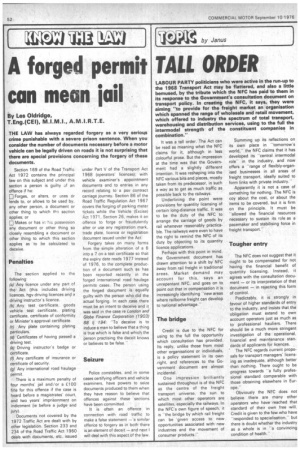TALL ORDER
Page 54

If you've noticed an error in this article please click here to report it so we can fix it.
LABOUR PARTY politicians who were active in the run-up to the 1968 Transport Act may be flattered, and also a little bemused, by the tribute which the NFC has paid to them in its response to the Government's consultation document on transport policy. In creating the NFC, it says, they were aiming "to provide for the freight market an organisation which spanned the range of wholesale and retail movement, which offered to industry the spectrum of total transport, warehousing and distribution services, using to the full the intermodal strength of the constituent companies in combination."
It was a tall order. The Act can be read as meaning what the NFC claims for it, although in less Colourful prose. But the impression at the time was that the Government had a slightly different intention. It was reshaping into the NFC various bits and pieces, mostly taken from its predecessor, in such a way as to get as much traffic as possible back to the railways.
Underlining the point were provisions for quantity licensing of certain long-distance traffic. It was to be the duty of the NFC to arrange the carriage of goods by rail whenever reasonably practicable. The railways were even to have the right to remind the NFC of its duty by objecting to its quantity licence applications.
Perhaps with this point in mind, the Government document has drawn attention to a shift by NFC away from rail freight in traditional areas. Market demand may account for this, says an unrepentant NFC, and goes on to point out that in compensation it is increasingly identifying "new areas where railborne freight can develop to national advantage."
The bridge
Credit is due to the NFC for using to the full the opportunity which consultation has provided. Its reply, unlike those from most other organisations or individuals, is a policy statement in its own right, and references to the Government document are almost incidental.
One impression brilliantly sustained throughout is of the NFC as the centre of the freight transport universe, the sun to which most other operators are satellites, especially the railways. In the NFC's own figure of speech, it is "the bridge by which rail freight can be "given access to new opportunities associated with new industries and the movement of consumer products."
Summing up its reflections on its own place in "tomorrow's world," the NFC claims that it has developed its "central intermodal role" in the industry, and now offers a "range of flexibly-organised businesses in all areas of freight transport, ideally suited to form links with private industry.
Apparently it is not a case of something for nothing. The NFC is coy about the cost, or about the items to be covered, but it is firm on the principle. It must be -allowed the financial resources necessary to sustain its role as a pacemaker and stabilising force in freight transport.
Tougher entry
The NFC does not suggest that it ought to be compensated for not having the financial benefit of quantity licensing. Instead, it agrees with the consultation document — or its interpretation of that document — in rejecting this form of control.
Predictably, it is strongly in favour of higher standards of entry to the industry, and insists that the obligation must extend to own account operators just as much as to professional hauliers. There should be a much more stringent investigation of the operational, financial and maintenance standards of applicants for licences. .
• The NFC regards current proposals for transport managers' licensing as inadequate, although better than nothing. There ought to be progress towards ''a fully professional standard comparable with those obtaining elsewhere in Europe.
Obviously the NFC does not believe there are many other operators who have reached that standard of their own free will. Credit is given to the few who have -responded to specialisation," but there is doubt whether the industry as a whole is in "a convincing condition of health.




























































































